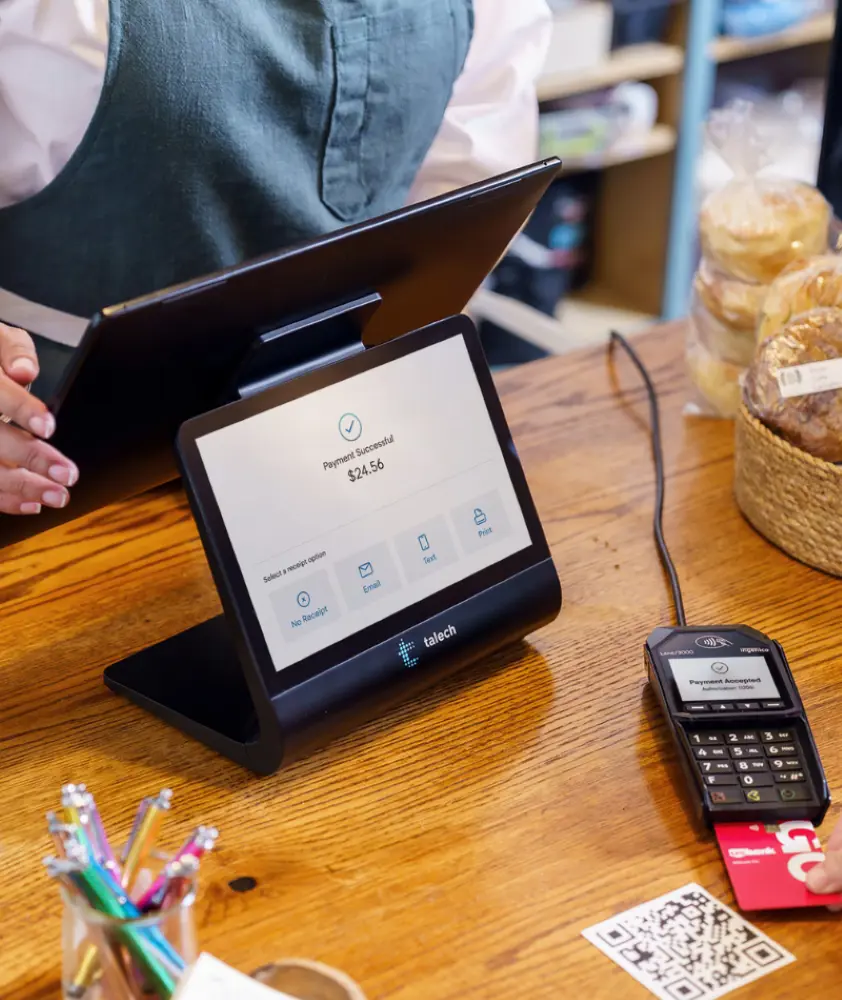Credit card processing is an essential service for businesses allowing business personnel to accept debit and credit card transactions securely and efficiently. In 2024, several credit card processing companies stand out due to their features, pricing structures, and customer service.
Pricing, fees, customer service, equipment, and additional supporting features are all important considerations when evaluating the best credit card processors.
Based on the data and service provided by these companies, the following list includes some of the best credit card processing companies of 2024:
1. National Processing
Payment processor National Processing offers affordable fees, practical integrations and card reader facilities to its consumers. It operates with high-risk merchants and gives companies across a range of industries a competitive alternative.
Processing Rate:
- Basic In-Person Package: 2.5% per transaction plus an additional 10 cents.
- E-commerce package for beginners: 2.9% + 30 cents per transaction.
- Package Advanced: 2.41% + 10 cents.
- Premium Package: Determined by quote.
Pros:
- Cheap processing costs for a flat-rate processor when done in person.
- No long-term commitments or termination fees.
- Collaborates with risky retailers.
- Connects to widely used accounting software, e-commerce sites, and point-of-sale systems.
- Round-the-clock phone assistance.
Cons:
- If you process less than $10,000 in a given month, the fees might be higher.
- There are different basic plans for processing transactions in person and online.
- More expensive than some competitors.
2. Shopify Payments
Shopify Payments is a fully integrated payment service that lets you accept payments almost immediately after signing up. Shopify Payments eliminates the need to set up a third-party provider for processing and the service is included in all subscription plans.
Shopify Payments provides a variety of payment methods and competitive processing rates. It makes an excellent choice for businesses that use Shopify as an e-commerce platform or a point-of-sale system.
Processing rates:
- 2.5%, 2.7% or 2.9% plus 30 cents per online payment for the Advanced, Shopify and Basic plans.
- 2.4%, 2.5% or 2.6% plus 10 cents for in-person payments on the Advanced, Shopify or Basic plans.
Pros:
- Accepts a variety of payment methods.
- It can customize the checkout page.
- Easy to set up and use.
- Transparent, flat-rate fees.
Cons:
- Shopify Payments requires an e-commerce plan with a monthly fee to be used.
- Fees for using a third-party payment gateway are applied.
3. Helcim
Helcim is a merchant services company that provides an all-inclusive platform along with transparent pricing. For most other small-business owners, it is a great option.
Helcim is an exceptional option for credit card processing since it fulfills a lot of requirements. It sets up quickly. You can take credit cards over the phone, through an app, online or in person with Helcim. Additionally, the prices are reasonable too.
Payment processing fees:
- Interchange plus 0.4% plus 8 cents for each in-person transaction (if monthly card transactions total no more than $50,000).
- Interchange plus 0.5% and 25 cents for each manually keyed or online transaction (if monthly card transactions total less than $50,000).
- ACH payments are charged 0.5% plus 25 cents.
The monthly fee is 0$
Pros:
- Fast setup typically within a day for approvals.
- Customer service is offered in-house seven days a week.
- Automatically provides volume-based discounts.
- Synchronizes with QuickBooks Online straight.
Cons:
- Deposits cannot be made on the same day. They must be made within two business days.
- The card reader is available for $199 per unit. It is not covered by the plan.
- Doesn't provide services to companies operating in specific sectors.
4. Square
Square is one of the few companies in the market offering a free version of their point-of-sale system. Numerous features and functionalities are included in the free version.
The free plan is among the most robust free POS systems and the pricing is clear. It also took first place in Nerd Wallet rankings of the greatest business software and point systems for point of sale.
Payment processing fees:
- 2.6% plus 10 cents for in-person transactions.
- 2.9% plus 30 cents for online transactions.
- 3.5% plus 15 cents for manually keyed transactions.
- 3.3% plus 30 cents for invoices.
Pros:
- Fast configuration.
- Provides hardware, point-of-sale software, a payment gateway, and payment processing all in one package.
- Instant access to funds is offered for a 1.5% fee of the total amount.
- For free subscriptions, customer service is available weekdays from 6 a.m. to 6 p.m.
- Pacific time for paid subscriptions customer service is available around-the-clock.
- Connects via a third-party app with the accounting programs Xero and QuickBooks Online.
Cons:
- Does not provide services to businesses in certain industries.
- Does not work on Windows devices.
5. Stripe
Stripe Payments is a robust payment processor for online transactions. It accepts dozens of payment methods and over 135 currencies.
Its open API and advanced developer tools enable you to create a checkout flow that feels unique, as long as you understand how to use the tools and implement code.
Stripe differentiates itself from competitors by offering a range of developer-friendly tools that let its users personalize their e-commerce business online payment process. Stripe is a good choice for companies of any size because it has pay-as-you-go pricing, volume discounts and no monthly fees.
Payment processing fees:
- 2.7% plus 5 cents for in-person transactions.
- 2.9% plus 30 cents for online transactions.
- 3.4% plus 30 cents for manually keyed transactions.
- 4.4% plus 30 cents for international transactions.
Monthly fee:
- The standard Stripe Connect fee is $0.
- $2 per account for Stripe Custom (the white-label option that lets businesses customize the checkout process) or Stripe Express (for marketplaces).
Pros:
- Fast configuration.
- Email, chat, and phone support is offered around the clock.
- Fits in with Online QuickBooks.
- There is a 1% fee for the instant payout option (with a minimum fee of 50 cents).
Cons:
- Certain industries' businesses cannot access certain services.
- Needs some technical know-how to utilize all of the features.
6. Stax by Fattmerchant
The merchant services company Stax is well-known for its subscription-based pricing structure and 0% interchange rate markup. It is known for low interchange fees and handle at least $5,000 in credit card transactions each month.
Plans from Stax begins at $99 per month providing businesses with interchange fees that are markup-free as well as a low fixed fee per transaction. It is therefore a wise option for companies with large sales volumes.
Payment processing fees:
- Interchange plus 8 cents to 15 cents.
Monthly fee:
- Growth: $99 per month.
- Pro: $159 per month.
- Ultimate: $199 per month.
Pros:
- There is no markup added to the interchange fees.
- Funding is available the same day for a 1% fee.
- The most affordable plan comes with a mobile reader or terminal for free.
- 24/7 on-site customer service is offered.
Cons:
- Setup takes longer than a payment service provider, typically 48 hours.
- Not every pricing plan includes QuickBooks Online sync.
- Does not provide services to businesses in certain industries.
7. Payment Depot
Payment Depot is a company owned by Stax. It offers a payment processing service that requires customers to pay a markup per transaction in addition to interchange. However, it is important to note that there are no monthly subscription fees.
The provider features such as low pricing and 24/7 support make it suitable for small businesses looking for cost-saving alternatives.
Payment Depot allows merchants to accept credit card payments in person and online. Instead of a monthly membership fee, it charges 0.2% to 1.95% above interchange rates. Contracts do not bind customers and can cancel at any time without incurring early termination fees.
Payment processing cost:
- 0.2%-1.95% plus interchange.
- Payment Depot charges a 0.2%-1.95% per transaction fee in addition to card network interchange fees.
There are no monthly subscription fees.
Pros:
- A 0% markup is applied on top of interchange fees.
- Certain pricing plans include free hardware.
- Excellent in-house customer support.
- Integrates with QuickBooks Online.
Cons:
- Approval takes approximately 24 hours which is longer than some competitors.
- Does not provide same-day funding.
- Only on weekdays is in-house customer support available.
- Does not provide services to businesses in certain industries.
8. Chase Payment Solution
Chase Payment Solutions is an established name in the credit card processing industry. It has been providing a variety of services tailored to businesses of all sizes and industries.
Chase Payment Solutions provides merchants with flat and interchange-plus rates, month-to-month terms and same- and next-day funding options through Chase's business banking services.
It serves over 4 million business customers and uses its vast data resources to provide valuable insights to its credit card processing customers.
Payment processing cost:
- In-person transaction fee: 2.6% plus 10 cents
- Online transaction fee: 2.9% plus 25 cents
- Keyed-in transaction fee: 3.5% plus 10 cents
Pros:
- Two-in-one processor and getting bank.
- Free monthly plans are available.
- Deposits are more convenient when processed by your bank.
Cons:
- Certain hardware prices are not readily available.
- No e-commerce integrations.
- Chase Business Complete checking account includes a monthly service fee of $15 for some merchants.
Content Sources:










